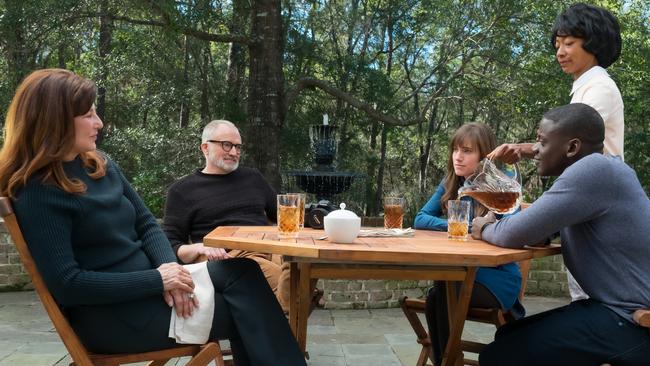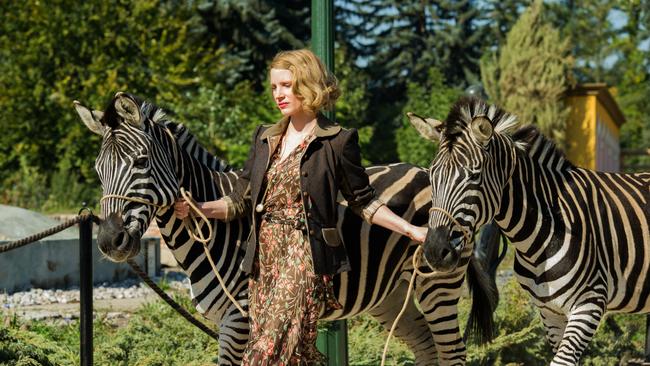Film reviews: Get Out; The Zookeeper’s Wife with Jessica Chastain
New thriller Get Out has been compared, with good reason, with a trail-blazing classic from 50 years ago.

The new thriller Get Out has been compared, understandably, with Guess Who’s Coming to Dinner, Stanley Kramer’s earnest, trailblazing film made 50 years ago. Race relations in America and elsewhere were far less relaxed then than they are now, and the idea of a “nice” young white girl (Katharine Houghton) determined to marry an African-American and bringing him home to meet her parents was confronting for many.
The casting made a great deal of difference: Katharine Hepburn and Spencer Tracy played the sympathetic parents, and everyone’s favourite black actor at the time, Sidney Poitier, played the boyfriend. It helped that his character was a doctor, educated, polite and well spoken. Kramer was being controversial but still playing it fairly safe (nonetheless, Australia’s vigilant film censors of the time eliminated some of the dialogue spoken by Tracy, in what proved to be his final film).
Times have changed and the nice young white girl in Get Out hasn’t even bothered to tell her parents that the photographer she has been dating for five months is black. Rose (Allison Williams) and Chris (British actor Daniel Kaluuya) are already living together when she decides they should spend a weekend with her mum, Missy (Catherine Keener), a hypnotherapist, and dad, Dean (Bradley Whitford), a neurosurgeon, at their grand but isolated home in the country. She assures Chris her parents aren’t racist. During the journey, with Rose driving, their car collides with a deer on a wooded road and the (white) cop who comes to file a report clearly is racist. But when they arrive at the house, Dean greets Chris with a hug, and their first evening together would have been a very pleasant and relaxed occasion if not for the arrival of Rose’s brother (Caleb Landry Jones), who acts rather strangely. Then there are the servants, Georgina (Betty Gabriel) and Walter (Marcus Henderson), both black, who live in the house — their attitudes towards Chris seem rather odd, too. Clearly there’s something not quite right, but what exactly is wrong?
Get Out is the first film directed by Jordan Peele, known in the US as co-star of the TV show Key & Peele. It’s a very up-to-the-minute story in that it’s firmly located in Trump’s America (on two occasions we’re told that Dean would have voted for a third term for Barack Obama if that were possible). Without wishing to give too much away about how the plot develops, it’s safe to say the film pulls a considerable switch on the traditional horror movie in which it’s invariably the minority race characters who are the first to be killed.
Peele, who also scripted, is very good at writing barbed dialogue, and as the film proceeds the audience is likely to feel as uncomfortable as Chris. Another key character — I won’t reveal which one — undergoes a remarkable and decidedly chilling transformation during the course of the drama.
The film is a considerable success, especially given it’s the writer-director’s first feature. His slow build-up is extremely effective as he piles small detail upon small detail until the drama explodes in the violence that horror movie aficionados demand. For my taste, the violent elements in the film are a bit excessive, as is the comedy routine provided by Milton “Lil Rel” Howery, who plays Chris’s best friend and his one link with the outside world. But these are relatively minor drawbacks in a film that is so timely and so subversive. By the time you get to the point where the arrival of a police car seems certain to indicate danger rather than salvation you begin to understand the African-American experience. Kaluuya is extremely good as the protagonist but it’s Williams who steals the film as the beautiful, intelligent young woman whose decision to bring her partner home to meet her parents results in such an unexpected and indeed terrifying series of events.

The Zookeeper’s Wife is a true story of the Holocaust. It’s based on a book of the same name by Diane Ackerman that was based on the diaries of Antonina Zabinska and the end credits acknowledge the co-operation of Zabinska’s two children. The central role is played by Jessica Chastain, and the director is New Zealander Niki Caro, whose first feature, Whale Rider, is still her best known.
It’s another amazing story, in the tradition of Schindler’s List and others, about gentiles who risked their lives to help their Jewish compatriots. As such it is bound to be inspirational, but dramatically it falls somewhat short of the most successful films on this subject.
The film opens in the summer of 1939 with lyrical scenes in which Antonina cycles cheerfully through the zoo she owns together with her husband, Jan (Belgian actor Johan Heldenbergh), followed by a baby camel and talking to the animals as though she’s channelling Julie Andrews playing a female version of Dr Dolittle. She’s devoted to her animals, and in the middle of a formal reception at the zoo attended by Lutz Heck (Daniel Bruhl), representing the Berlin Zoo, she leaves the guests to help revive a sick baby elephant at some personal risk from the animal’s anxious mother.
Before long Germany invades Poland and during the bombing of the city the zoo is badly damaged, terrifying the animals, many of which flee their shattered cages to roam the streets of the city. The Zabinskas are permitted to continue to live in the zoo when they strike a deal with Heck, now an SS officer assigned to Warsaw, to raise pigs to feed the occupying Germans. For pig food they’re given access to the ghetto and its piles of garbage. One day Jan witnesses the sexual assault on a young Jewish girl (Shira Haas), and this incident angers him so much he determines to try to help the inmates of the ghetto, noting that “Jews or Gentiles — it never mattered to me”. And so he uses his access to the closed-off section of the city to smuggle Jews out of their confinement and hide them in cellars below the zoo.
The grim story follows a fairly familiar pattern. Antonina has to stave off the advances of Heck, and Jan has some narrow escapes as he comes and goes to the ghetto. Eventually he joins the Polish Resistance as the war draws to an end.
The film was largely made in the Czech Republic, and the cast members, drawn from several countries, speak English with a variety of accents. Chastain’s Polish accent is moderately convincing but a little distracting. With this sort of international production the fact everyone speaks English with a different accent is often a problem.
Caro creates some impressive scenes, some involving the fates of the animals, one involving a mother and daughter who think they’ve escaped. But on the whole the film never quite manages to create the required mood, even though it reminds us once again of the scale and horror of one of the greatest crimes of the 20th century.
Get Out (MA15+)
4 stars
National release
The Zookeeper’s Wife (M)
3 stars
National release



